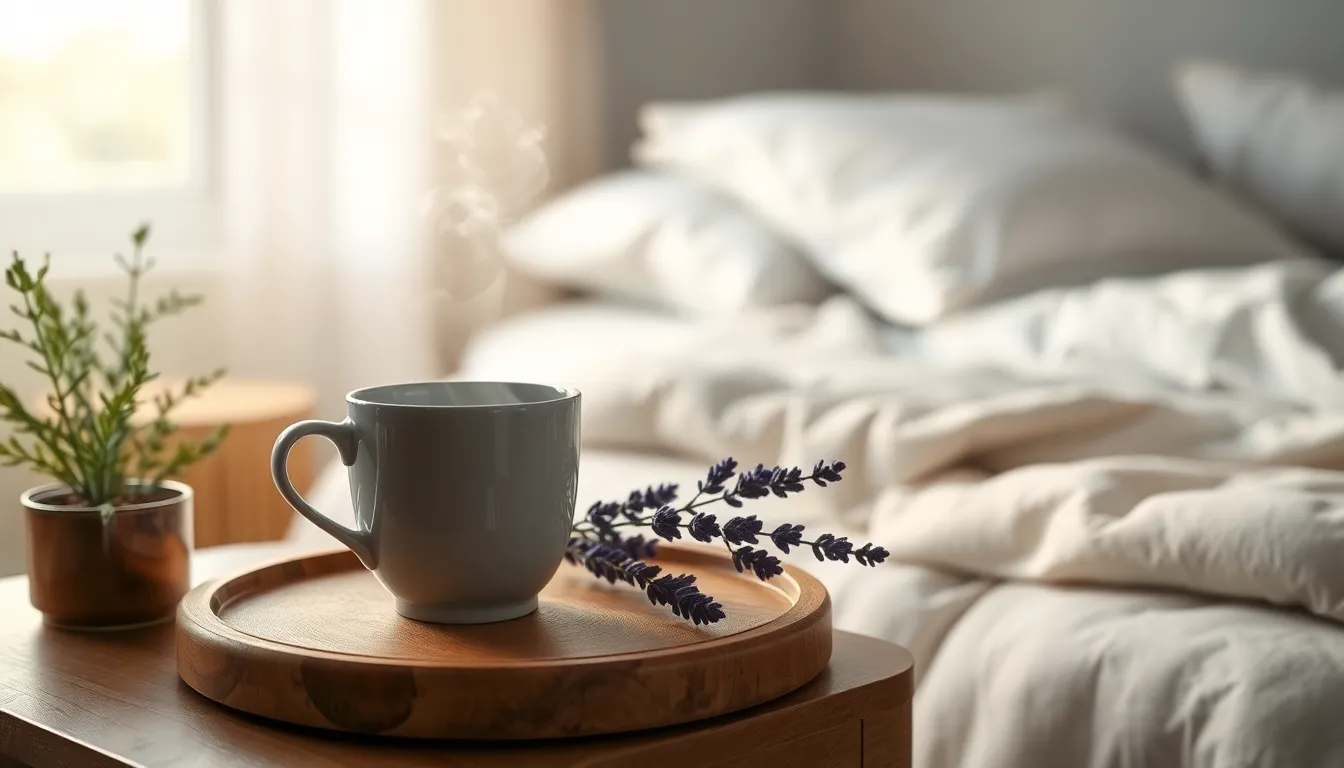Table of Contents
ToggleTossing and turning all night, counting sheep like they’re going out of style? It’s time to break the cycle of sleeplessness with some herbal magic. While counting those fluffy friends might work for some, others need a little extra help from nature’s pharmacy. Herbal insomnia solutions not only promise sweet dreams but also add a dash of fun to your bedtime routine.
Imagine sipping a warm cup of chamomile tea or indulging in a lavender-infused bath that whisks you away to dreamland. These natural remedies are like a cozy blanket for your mind, easing stress and lulling you into a peaceful slumber. Forget the harsh side effects of over-the-counter sleep aids; it’s time to embrace the soothing power of herbs. Get ready to discover how these delightful botanicals can transform your nights from restless to restful.
Overview of Herbal Insomnia Solutions
Herbal insomnia solutions offer natural approaches to addressing sleeplessness. Chamomile, renowned for its calming properties, is frequently consumed as a tea before bedtime. Lavender essential oil can also promote relaxation when diffused or applied topically. Valerian root serves as another effective remedy; clinical studies indicate it can significantly reduce the time taken to fall asleep.
Passionflower and lemon balm are two additional herbal options that may enhance sleep quality. Studies show these herbs possess sedative effects, helping to alleviate anxiety and elevate feelings of calm. These herbal remedies work together to create a tranquil bedtime routine, which can lead to more restful nights.
Incorporating these herbs into daily life can be straightforward. Tea blends featuring chamomile and lavender provide a soothing ritual. Some individuals prefer capsules or tinctures for convenience. When combining multiple herbs, it’s essential to start with lower doses and monitor the body’s response.
Choosing herbal insomnia solutions may also reduce the reliance on pharmaceutical sleep aids, which often come with side effects. Opting for these natural alternatives fosters a healthier sleep pattern. These remedies empower individuals to take control of their sleep habits without the risk associated with synthetic medications. As more research emerges, the benefits of herbal solutions in managing insomnia continue to gain recognition.
Common Herbs for Sleep

Natural herbs play a significant role in promoting restful sleep. Several options are available for individuals seeking effective herbal solutions.
Valerian Root
Valerian root is well-known for its calming properties. This herb acts as a natural sedative, making it easier to fall asleep. Studies show that valerian root can reduce the time it takes to drift into slumber. It may also enhance sleep quality by improving deep sleep stages. Available in various forms, including capsules and teas, valerian root can effortlessly fit into a bedtime routine. Individuals should consult healthcare providers when considering valerian root, especially when taking other medications.
Chamomile
Chamomile stands out as a popular herbal remedy for sleep. Its soothing effects stem from apigenin, an antioxidant found in the flowers. Drinking chamomile tea before bedtime helps promote relaxation and prepare the body for sleep. Research indicates that consistent consumption of chamomile tea can improve sleep quality and duration. Various forms exist, from dried flowers to extracts, ensuring easy incorporation into daily life. Individuals seeking a simple, calming bedtime ritual often turn to chamomile for its gentle effects.
Lavender
Lavender is another effective herb for enhancing sleep quality. The calming scent of lavender has long been utilized in aromatherapy to alleviate anxiety and induce relaxation. Studies reveal that inhaling lavender oil can significantly increase slow-wave sleep, known for its restorative properties. People often use lavender essential oil in diffusers or add it to bath routines. Creating a tranquil environment with lavender can support peaceful nights and improve overall restfulness. Those seeking a natural sleep enhancer frequently choose lavender for its versatility and calming effects.
Effectiveness of Herbal Remedies
Herbal remedies demonstrate significant effectiveness in promoting better sleep quality. Chamomile, for instance, contains the antioxidant apigenin, which binds to certain receptors in the brain and fosters sleepiness. Studies indicate that individuals consuming chamomile tea regularly can experience improved sleep quality.
Valerian root serves as another potent option. Research shows it acts as a natural sedative, helping people fall asleep faster and enhancing deep sleep stages. Its calming properties make valerian a popular choice for those struggling with insomnia.
Lavender, known for its soothing aroma, offers additional benefits. It can alleviate anxiety and enhance relaxation, as demonstrated in various aromatherapy studies. Evidence supports that lavender usage can increase restorative slow-wave sleep, contributing to a more restful night.
Passionflower and lemon balm also exhibit sedative effects. These herbs can reduce anxiety and promote a sense of calmness, making them beneficial additions to an evening routine. When combined with other herbs, such as chamomile and valerian, they may enhance the overall effectiveness of herbal treatments.
Incorporating these herbal solutions into daily life can reduce reliance on pharmaceutical sleep aids. Effective methods include brewing herbal teas or using essential oils. Individuals should exercise caution when blending multiple herbs to avoid adverse reactions.
Research increasingly highlights the potential of herbal remedies for managing insomnia. As awareness grows, more people recognize the value of these natural alternatives in fostering healthier sleeping patterns. Emphasizing these herbs’ calming properties empowers individuals to take control of their sleep hygiene.
Potential Side Effects
Herbal insomnia solutions can offer numerous benefits, but it’s essential to be aware of potential side effects. Chamomile may cause allergic reactions in individuals sensitive to plants in the Asteraceae family. Valerian root may lead to headaches or gastrointestinal issues in some users.
Lavender, while popular for its calming properties, can produce skin irritation when applied topically. Passionflower might cause dizziness or confusion in certain cases, especially when taken in excessive amounts. Lemon balm may lead to nausea or vomiting in sensitive individuals.
Notably, combining multiple herbs can amplify these side effects. Individuals should consult a healthcare professional before incorporating new herbs into their routine, particularly if they’re pregnant, breastfeeding, or taking medications.
Everyone experiences herbs differently, so monitoring one’s reaction is critical. It’s advised to start with a lower dosage to assess tolerance, gradually increasing as needed. Choosing high-quality herbal products from reputable sources can minimize the risk of contamination or adverse effects.
While herbal remedies offer natural alternatives for insomnia, understanding potential side effects ensures safer usage.
How to Incorporate Herbal Solutions into Your Routine
Incorporating herbal solutions into a daily routine can enhance sleep quality effectively. Start by brewing chamomile tea before bedtime, aiming to drink it 30 minutes prior to sleep. Choose to mix lavender essential oil with a carrier oil and diffuse it in the bedroom to create a calming atmosphere.
Consider trying valerian root capsules, taking them about an hour before sleep for optimal results. Establish a ritual that includes winding down with these herbal remedies. Integrating lemon balm into evening teas can offer additional relaxation, making it a great option for those struggling with insomnia.
Passionflower tea also serves as a soothing choice. Including it in the evening routine can help enhance the sedative effects provided by other herbs. Diversifying herbal intake may lead to better sleep outcomes, but monitoring individual responses remains essential.
Experts advise individuals to track their reactions when introducing new herbs. Starting with lower dosages helps determine tolerance and minimizes possible side effects. Consulting a healthcare professional is recommended, especially for those who are pregnant, breastfeeding, or taking medications.
Make adjustments based on personal preferences and experiences. Prioritizing a consistent sleep schedule alongside herbal solutions fosters healthier sleep patterns. By making these small changes, individuals can create a supportive environment for better sleep outcomes.
Herbal insomnia solutions offer a natural pathway to improved sleep quality. By incorporating calming herbs like chamomile and lavender into daily routines, individuals can create a soothing environment that promotes relaxation. The potential benefits of these remedies extend beyond just better sleep; they empower individuals to manage their sleep habits more effectively and reduce reliance on pharmaceutical options.
As more people seek alternatives to conventional sleep aids, the recognition of herbal remedies continues to grow. By approaching these solutions mindfully and consulting with healthcare professionals when necessary, individuals can safely explore the world of herbal sleep aids. With a commitment to personal well-being and a few simple adjustments, restful nights are well within reach.







